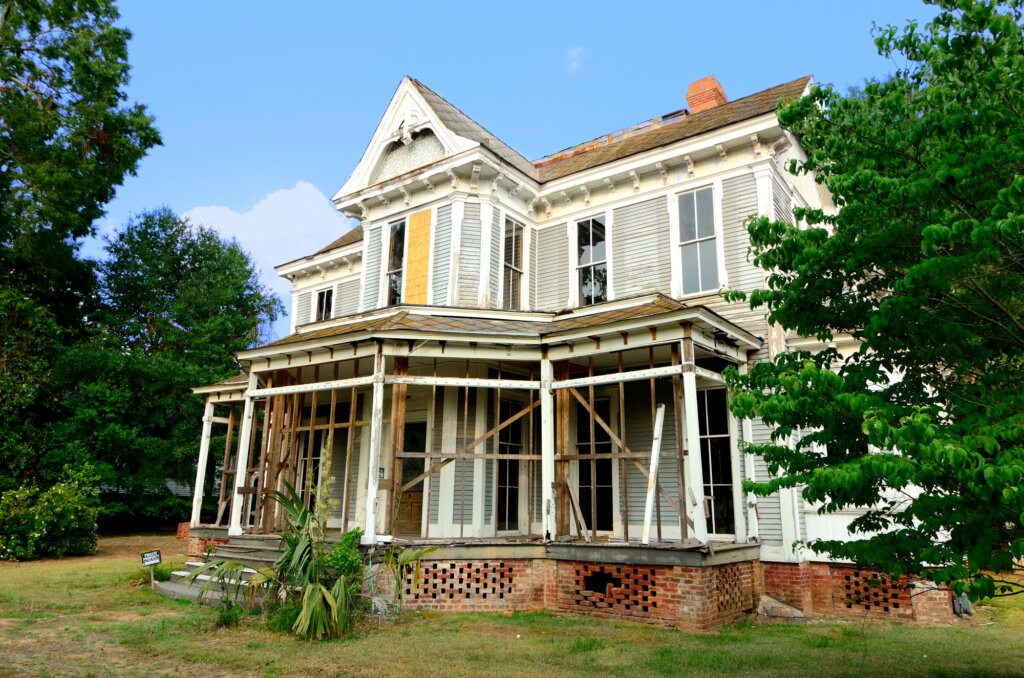
Selling an Inherited Property in Baltimore
Dealing with an inherited property can pose emotional and financial challenges. The burden of costly upgrades and repairs, tax implications, and potential probate issues can be overwhelming. However, inherited properties present lucrative opportunities for real estate investors and buyers seeking discounted properties to renovate. Selling an inherited property requires special considerations and steps to ensure a successful transaction. This guide will walk you through the process of selling an inherited property in Baltimore, Maryland to maximize your return on investment.
How To Sell An Inherited Property in Baltimore
Have you recently inherited a property and find yourself uncertain about the next steps? In many states, an inherited property typically undergoes a probate process to establish the legal owner. Probate involves a legal procedure where the Court officially transfers ownership of the estate’s assets to designated beneficiaries and/or heirs. The duration of this process varies significantly based on the presence and specific contents of a will.
- Determine the Executor
For inherited properties with a will, establishing the executor of the estate should be straightforward. One of the most important aspects of a will is establishing an executor that is able to carry out the deceased’s wishes through the process of probate. Any assets listed in a will can’t be sold until the will is validated by the Court but, once approved, the executor of the will is allowed to act on the wishes of the deceased. But if the will is contested or there is no will, the process might take longer as the Court gets involved.
The probate court will appoint someone not associated with the family as an administrator to the estate. These administrators play a similar role as an executor; they are responsible for carrying out the wishes of the deceased as stated in the will, as well as paying off any of the estate’s debts and distributing any assets. They may also determine if any real estate assets will need to be sold to pay off the estate’s debts, including back taxes, mortgages, etc.
- Working with Lawyers and Real Estate Agents
Probate can be a complex and challenging process, which is why it’s crucial to have a knowledgeable lawyer by your side to assist you in navigating the potential obstacles of selling an inherited home. Once you have obtained the probate court’s approval to proceed with the sale of the property, the next wise step is to collaborate with a real estate agent who has experience in handling inherited homes. A skilled agent with probate expertise will grasp the intricacies and guidelines associated with this type of sale. They can aid you in identifying the ideal buyer to secure top dollar for the inherited property. Moreover, they will serve as a valuable resource to advise you on worthwhile investments in repairs and upgrades, distinguishing them from unnecessary expenses. Heeding their guidance could make the difference between a swift, profitable property sale and being burdened with a home that languishes on the market, eventually selling below its market value.
- Resolve Any Debts
When you hear the word “inheritance” do you think of a mysterious great-aunt leaving you a million-dollar mansion in the woods, or do you understand the reality of having to deal with a property that might have liens against the title, years of back taxes, as well as a mortgage that leaves you with the ability to make much of a profit after a sale? Sadly, dealing with a loved one’s passing often means dealing with their debt, whether that’s in the form of taxes, a mortgage, or maxed out credit cards. Any assets you inherit must go to paying off that debt first before you can see one dime of the estate. While a house may seem like a huge asset, it also can be a huge money pit. An experienced estate advisor can help you research your options when it comes to dealing with an estate.
- Clean & Restore the Home
Once ownership has been decided and the property is considered yours, your next step will be to decide whether you want to live in it, rent it out, or sell it. Many times, when a loved one passes they leave behind a house that is not in the best of shape. Whether the property hasn’t been kept up in the past decade and needs major cleaning and repair, or there were never any upgrades done and the house will need to be completely renovated to make it “market ready”, this is the part of an inheritance that is often forgotten about.
Do all heirs have to agree to sell the property?
When it comes to selling an inherited house or property, the agreement of the Heirs is not always required. If ownership has been established through a will or by the probate court, individual Heirs do not need to agree to the sale. However, in cases where ownership has not been determined, such as in estates without a will or with a Court-appointed administrator, all Heirs must consent to the sale. This also applies to properties auctioned by the Court to settle the estate’s debts. If a buyer acquires a house at auction and faces opposition from one or more Heirs, the sale may be paused until a resolution is reached through negotiation.
- How to Settle a Disagreement
There are a variety of options for settling disagreements among Heirs over an estate, but the first step is making sure that a loved one has an executor. Having a point person who is there to make sure the deceased’s wishes are followed as set forth in the will can ensure that there are no arguments over how the assets will be dealt with. If there is no executor and the will is being disputed, your next step may be hiring a mediator. Having a neutral third party to help work out differences will be much more affordable than a legal battle in probate court.
- Best Practices
What happens if the issue revolves around the executor themselves? Disputes may arise when a family member is designated as the executor or trustee of a will, leading to conflicts with other family members. If you find yourself in this situation, a potential solution is for the individual to reject the appointment and opt for an impartial fiduciary, like an estate-planning attorney, to manage the will. Stepping aside while a neutral party takes charge not only helps prevent disagreements but also allows everyone the space and time to navigate challenging emotions before irreparable harm is done to your family.
How is inherited property taxed when sold?
State and local governments in the United States collected over $5.3 billion in revenue from estate and inheritance taxes in 2020. That’s a lot of taxes! But with laws and regulations different from state-to-state, you’ll want to do your research and contact a lawyer with knowledge and experience of taxes and estate planning as you deal with a surprise inheritance or you’re writing your own will.
State Tax Laws
Each state has different laws regarding inheritances. In the case of the sale of an inherited property, states may take an estate tax, an inheritance tax, as well as a capital gains tax on your inheritance. Currently, twelve states have an estate tax, 5 have an inheritance tax, and one has both an estate and inheritance tax.
- Capital Gains Tax on Inherited Property
Understanding Capital Gains Tax and State Requirements
Capital gains tax is a levy imposed on the profit gained from selling an inherited asset. While the tax is triggered upon selling the asset, not upon inheritance, it is calculated based on the difference between the selling price and the original purchase price. Most states mandate the payment of this tax on inherited properties, with potential exemptions for properties sold below a specified threshold. For instance, in Washington State, no capital gains tax is imposed on properties sold for under $250,000. There are various strategies to potentially minimize or avoid capital gains tax liabilities, such as reinvesting the proceeds in another property. It is advisable to seek guidance from a tax attorney well-versed in local regulations before finalizing the sale of your property.
- Estate Taxes
An estate tax is a tax paid directly out of the estate to the state before anyone is able to inherit it. Worried that you might get a huge hit taken from the estate? Don’t worry! The estate tax has a minimum threshold which in 2023 was $12.92 million for individuals. This means that the government is not able to charge you an estate tax unless your total taxable estate is worth $12,920,001. The remainder is passed on estate tax-free. Despite having such a high threshold, each year more states repeal their estate tax laws, losing out on millions of dollars of revenue.
- Inheritance Taxes
Only six states have an inheritance tax, meaning that it is likely that you are in the lucky majority that won’t have to deal with this. But if you live in one of those six states – Maryland, Nebraska, Kentucky, New Jersey, Pennsylvania, and Iowa – you as a beneficiary/Heir to an estate will be required to pay taxes on your inherited assets and properties. But don’t worry – even if you live in a state that has an inheritance tax, you won’t have to pay a dime if the deceased lived in one of the 44 states that does not have this tax.
Documents required to sell an inherited property
To show legal ownership and place a property for sale, you will need to have a copy of the documents issued by the court that grant you the legal authority to act as the executor or administrator of the estate. These documents will establish your ability to manage the inherited property. Once a buyer is found and you are ready to close, you’ll need the deed, title insurance, or other relevant legal records to establish the legal ownership of the inherited property.
Do your research regarding what additional documents may be needed to sell an inherited property! Some jurisdictions may require additional property-related documents, including previous surveys, inspections, or any other relevant paperwork that pertains to the property’s condition or history.
Is there an easier way to sell?
Yes, you’re in luck! At Baltimore Housing Source, Inc, we specialize in purchasing inherited properties in Baltimore with cash, offering a seamless process with minimal fees. Reach out today to receive a competitive cash offer for your inherited house, condo, or property. Regardless of the condition, we are interested in buying. Additionally, we provide assistance in navigating the intricate probate house selling process. Our goal is to simplify your home selling journey, allowing you to transition smoothly to the next chapter of your life.
If you own a property that’s stuck in probate that you are ready to sell, call us at (410)775-6573 day or night to get a competitive cash offer for that inherited home. We buy properties in any condition and no matter what the estate’s financial situation might be. Even if the house suffered major damage in the last storm or was neglected for years and needs a large amount of upgrades to make it “market ready”, once you accept our fair cash offer our team of experts will handle all of those expensive repairs so you don’t have to! We make selling an inherited house easy.

